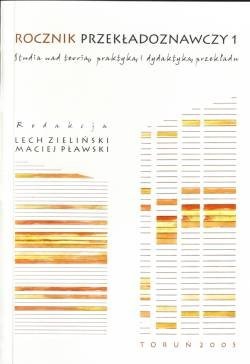Kształcenie filologiczne a dydaktyzacja przekładu
DOI:
https://doi.org/10.12775/RP.2005.010Słowa kluczowe
dydaktyka przekładu, nauczanie języków, filologia uniwersyteckaAbstrakt
Challenges that translation faces in the globalised modern world, with an increasingly growing demand for translators, instigate the need for the discussion on its didactics-related aspects. The article attempts at the definition of the place and role occupied by translation in the training and foreign language teaching at university (philology) departments. Differences in cognitive processing existing between translation skills and language skills constitute one of the foci of our deliberations. The present educational situation as well as syllabus outlines, underlying this article, were also subject to analysis. As far as the pragmatic perspective is concerned, the article relies on didactic experiences of the author (stemming from translation teaching experience at the English Department of the Nicholas Copernicus University in Toruń).
Bibliografia
Adab, Beverly J., 1996, „Training students to see how the pieces of the jigsaw fit together”,[w:] B. Lewandowska-Tomaszczyk, M. elen (eds.), Translation and Meaning, Maastricht: Universitaire Pers Maastricht, part 3, s. 28–292.
Bowen, David, 1994, „Teaching and learning styles”, [w:] Cay Dollerup, Annette Lindegaard (eds.), Teaching Translation and Interpreting 2. Insights, Aims, Visions, Amsterdam–Philadelphia: John Benjamins, s. 175–181.
Danks, Joseph H. et al. (eds.), 1997, Cognitive Processes in Translation and Interpreting, ousand Oaks–London–New Delhi: Sage. Dębski, Antonii, 2002, „Po co studiować dzisiaj filologię obcą? Słowo o curriculum studiów neofilologicznych i kompetencjach ich absolwentów”, [w:] Język a komunikacja 4, t. 2: Język trzeciego tysiąclecia II. Polszczyzna a języki obce: przykład i dydaktyka, red. Władysław Chłopicki, Kraków, s. 257–262.
Dollerup, Cay, Loddegaard, Annette, 1992, Teaching Translation and Interpreting. Training, Talent and Experience, Amsterdam–Philadelphia: John Benjamins.
Dollerup, Cay, Lindegaard, Annette, 1994, Teaching Translation and Interpreting 2. Insights, Aims, Visions, Amsterdam–Philadelphia: John Benjamins.
Dollerup, Cay, 1994, „Systematic feedback in teaching translation”, [w:] Cay
Dollerup, Annette Lindegaard (eds.), Teaching Translation and Interpreting 2. Insights, Aims, Visions, Amsterdam–Philadelphia: John Benjamins, s. 121–132.
Dollerup, Cay, Appel, Vibeke, 1995, Teaching Translation and Interpreting 3. New Horizons, Amsterdam–Philadelphia: John Benjamins.
Dollerup, Cay, 1995, „e emergence of the teaching of translation”, [w:] Cay Dollerup, Vibeke Appel (eds.), Teaching Translation and Interpreting 3. New Horizons, Amsterdam–Philadelphia: John Benjamins, s. 19–30.
Gile, Daniel, 1994, „e process-oriented approach in translation training”, [w:] Cay Dollerup, Annette Lindegaard (eds.), Teaching Translation and Interpreting 2. Insights, Aims, Visions, Amsterdam–Philadelphia: John Benjamins, s. 107–112.
Groot, Annette M. B. de, 1997, „The Cognitive Study of Translation and Interpretation: ree Approaches”, [w:] Joseph H. Danks et al. (eds.), Cognitive Processes in Translation and Interpreting, ousand Oaks– –London–New Delhi: Sage, s. 25–56.
Harris, Brian and Bianca Sherwood, 1978, „Translation as an innate skill”, [w:] D. Gerver and H. W. Sinaiko (eds.), Language and Communication, New York: Gardner, s. 155–170.
Kaiser-Cooke, Michele, 2000, „Theory in practice: translation as trans-disciplinary action”, [w:] Mira Kadric, Klaus Kaindl, Franz Pöchhacker (eds.), Translationswissenscha, Tubingen: Stauffenburg Verlag, s. 67–79.
Kadric, Mira, Kaindl, Klaus, Pöchhacker Franz (eds.), 2000, Translationswissenscha , Tübingen: Stauffenburg Verlag.
Kiraly, Don, 2000, A Social Constructivist Approach to Translator Education. Empowerment from eory to Practice, Manchester: St. Jerome Publishing. Klaudy, Kinga, 1995, „Quality assessment in school vs professional translation”, [w:] Cay Dollerup, Vibeke Appel (eds.), Teaching Translation and Interpreting 3. New Horizons, Amsterdam–Philadelphia: John Benjamins, s. 197–204.
Kussmaul, Paul, 1995, Training the Translator, Amsterdam–Philadelphia: John Benjamins.
Lewandowska-Tomaszczyk, Barbara, elen, Marcel (eds.), 1996, Translation and Meaning, part 3, Maastricht: Universitaire Pers Maastricht.
Lörscher, Wolfgang, 1991, Translation Performance, Translation Process, and Translation Strategies, Tübingen: Gunter Narr Verlag.
Mackenzie, Rosemary, 1998, „e Place of Language Teaching in a Quality Oriented Translators’ Training Programme”, [w:] K. Malmkjær (ed.), Translation and Language Teaching, Manchester: St. Jerome Publishing, s. 15–19.
Maia, Belinda, 1996, „e role of translation theory in the teaching of general and non-literary translation”, [w:] B. Lewandowska-Tomaszczyk, M. elen (eds.), Translation and Meaning, part 3, Maastricht: Universitaire Pers Maastricht, s. 164–173.
Malmkjær, Kirsten, (ed.), 1998, Translation and Language Teaching, Manchester: St. Jerome Publishing.
Pym, Anthony, 1992, „Translation error analysis and the interface with language teaching”, [w:] Cay Dollerup, Annette Loddegaard (eds.), Teaching Translation and Interpreting: Training, Talent and Experience, Amsterdam– Philadelphia: John Benjamins, s. 278–288.
Reiss, Katharina, Vermeer, Hans J., 1984, Grundlegung einer allgemeinen Translationstheorie, Tübingen: Niemeyer.
Sainz, Maria Julia, 1995, „Awareness and responsibility: our students as partners”, [w:] Cay Dollerup, Vibeke Appel (eds.), Teaching Translation and Interpreting 3. New Horizons, Amsterdam–Philadelphia: John Benjamins, s. 137–144.
Shreve, Gregory M., 1997, „Cognition and the Evolution of Translation Competence”, [w:] Joseph H. Danks et al. (eds.), Cognitive Processes in Translation and Interpreting, ousand Oaks–London–New Delhi: Sage, s. 120–137.
Snell-Hornby, Mary, 1992, „e professional translator of tomorrow: language specialist or all-round expert?”, [w:] Cay Dollerup, Annette Loddegaard (eds.), Teaching Translation and Interpreting: Training, Talent and Experience, Amsterdam–Philadelphia: John Benjamins, s. 9–22.
Toury, Gideon, 1995, Descriptive Translation Studies and Beyond, Amsterdam– Philadelphia: John Benjamins.
Ulrych, Margherita, 1995, „Real-world criteria in translation pedagogy”, [w:] Cay Dollerup, Vibeke Appel (eds.), Teaching Translation and Interpreting 3. New Horizons, Amsterdam–Philadelphia: John Benjamins, s. 251–259.
Wilss, Wolfram, 1996, Knowledge and Skills in Translator Behavior, Amsterdam– Philadelphia: John Benjamins.
Witte, Heidrun, 1995, „Contrastive culture learning in translator training”, [w:] Cay Dollerup, Vibeke Appel (eds.), Teaching Translation and Interpreting 3. New Horizons, Amsterdam–Philadelphia: John Benjamins, s. 73–79.
Zieliński, Lech (w druku), „Nauczanie przekładu (tekstów fachowych) na kierunkach neofilologicznych. Stan obecny, perspektywy rozwoju”, w serii: Język a komunikacja 8, Kraków.
Pobrania
Opublikowane
Numer
Dział
Statystyki
Liczba wyświetleń i pobrań: 520
Liczba cytowań: 0



